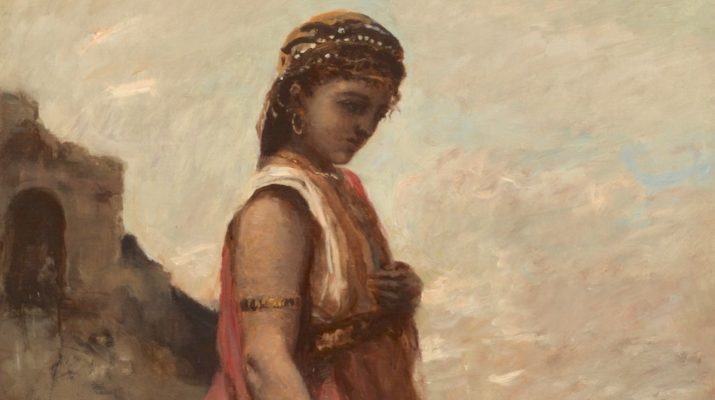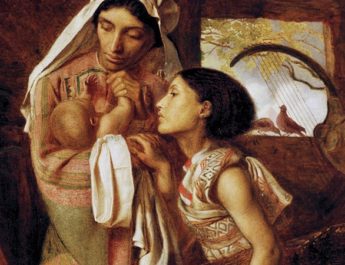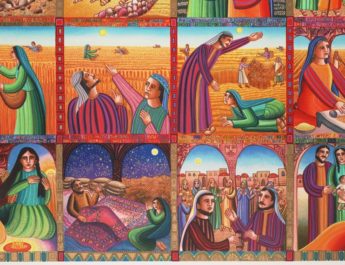Judith 13:18-20
Feast of the Ever-Blessed Virgin Mary – A Women’s Lectionary
18 Then UzziahA saidB to her, “O daughter,C
A “Uzziah” = Ozias. 2x in NT. From Hebrew Uzziyyah (Uzziah, “my strength is the Lord”); {from oz (strength in the sense of force, majesty, praise, material and physical strength, the abstract notion of security; also social or political power)} + Yah (God, the Lord – shortened form of the holy name of God); {from YHVH (proper name of the God of Israel; the self-existent and eternal one); {from havah (to become) or from hayah (to come to pass, become, be)}}. This is Uzziah or Ozias, meaning “my strength is the Lord.”
B “said” = lego. This is to speak, say, name, call, command. It is generally to convey verbally.
C “daughter” = thugater. This is daughter, a related female or one who lives with you.
you are blessedD by the Most HighE GodF above all other womenG on earth,H
D “blessed” = eulogetos. Related to “said” in v18. 8x in NT. From eulogeo (speaking well of – speaking so that the other is benefited; praise, bless, thank, or call for a blessing); {from eu (good, well, well done, rightly) + logos (word, statement, speech, analogy; a word that carries an idea or expresses a thought, a saying; a person with a message or reasoning laid out in words; by implication, a topic, line of reasoning, or a motive; can be used for a divine utterance or as Word – Christ); {from lego (see note B above)}}. This is blessed, spoken well of, to be praiseworthy, or adorable. This is the root that “eulogy” comes from.
E “Most High” = Hupistos. 13x in NT. From hupsos (height, high position, heaven, dignity, eminence; elevation, altitude; to be exalted); from hupsi (on high, aloft); from huper (over, above, beyond) This is highest, heights, heaven. It can also refer to God as Most High or the Supreme One.
F “God” = Theos. From Proto-Indo-European origins, meaning do, put, place. This is God or a god in general.
G “women” = gune. Perhaps from ginomai (to come into being, to happen, become, be born; to emerge from one state or condition to another; this is coming into being with the sense of movement or growth). This is woman, wife, or bride. This is where the word “gynecologist” comes from.
H “earth” = ge. This is earth, land, soil, region, country, the inhabitants of an area.
and blessedI be the LordJ God, who createdK the heavensL and the earth,
I “blessed” = eulogeo. Related to “said” and “blessed” in v18. See note D above.
J “Lord” = Kurios. From kuros (authority, supremacy). This is a respectful address meaning master or sir. It refers to one who has control or power greater than one’s own. So, it was also applied to God and Jesus as Master or Lord.
K “created” = ktizo. 15x in NT. Probably akin to ktaomai (to get, purchase, possess). This is to build, create, form, shape. It refers to God’s acts of creation.
L “heavens” = ouranos. May be related to oros (mountain, hill) with the notion of height. This is the air, the sky, the atmosphere, and heaven. It is the sky that is visible and the spiritual heaven where God dwells. Heaven implies happiness, power, and eternity.
who has guidedM you to cut offN the headO of the leaderP of our enemies.Q
M “guided” = kateuthuno. Related to “blessed” and “blessed” in v18. 3x in NT. From kata (down, against, throughout, among) + euthuno (to guide, steer, make a straight direction); {from euthus (immediately, upright, straight and not crooked); {perhaps from eu (see note D above) + tithemi (to put, place, set, fix, establish in a literal or figurative sense; properly, this is placing something in a passive or horizontal position)}}. This is to make straight i.e. take the most direct route. It can also mean to direct or guide.
N “cut off” = trauma. 1x in NT. Perhaps from titrosko (to wound). This is a wound. It is where the word “trauma” comes from.
O “head” = kephale. This is head or chief. It can be a literal head or, figuratively, a ruler or lord. It can also refer to a corner stone. This is where the word “cephalic” comes from.
P “leader” = archon. From archo (to rule, begin, have first rank or have political power). This is ruler, leader, magistrate, official, prince, chief.
Q “enemies” = echthros. From echthos (hatred). This is an openly hostile person so an enemy, a foe, or a hated person. This speaks of irreconcilable hostility. It can also mean adversary and/or refer to Satan.
19 Your hopeR will never departS from the heartsT
R “hope” = elpis. From elpo (to anticipate, welcome, expect; usually to anticipate positively). This is expectation, hope, trust, confidence faith. The expectation can be abstract or concrete.
S “depart” = aphistemi. 14x in NT. From apo (from, away from) + histemi (to stand, place, set up, establish, stand firm). This is to remove, repel, refrain, depart from, foment a revolt, repel.
T “hearts” = kardia. Literally the heart, but figuratively mind, character, inner self, will, intention, thoughts, feelings. Also, the center of something. The word heart is only used figuratively in the Old and New Testaments. This is where “cardiac” comes from.
of thoseU who rememberV the powerW of God.X
U “those” = anthropos. Probably from aner (man, male, husband) + ops (eye, face); {from optanomai (to appear, be seen); perhaps from horao (become, seem, appear)}. This is human, humankind. Used for all genders.
V “remember” = mnemoneuo. From mnemon (mindful) OR from mneme (memory or mention); {from mnaomai (to remember; by implication give reward or consequence) or mimnesko (to remind or remember; memory through an active, intentional process or being mindful; not incidentally or accidentally remembering); or form meno (to stay, abide, wait, endure) or from massaomai (to chew, gnaw); from masso (to knead, squeeze)}. This is to remember, recollect. It does not necessarily imply remembering something that you forgot – it could be simply calling something to mind. It can mean to punish or rehearse.
W “power” = ischus. 10x in NT. Perhaps from is (force) + echo (to have, hold, possess). This is strength, might, power, force, or ability. It is power that engages immediate resistance.
X Some manuscripts add, “until forever” = heos + aion. Aion is from the same as aei (ever, always, unceasingly, perpetually; on every occasion). This is an age, cycle of time, course, continued duration. It is also used to describe the eternal or forever. This is the word used to discuss the present age or the messianic age.
20 May God grantY this to be a perpetualZ honorAA to you, and may he rewardBB you with blessingsCC
Y “grant” = poieo. This is to make, do, act, construct, abide, or cause.
Z “perpetual” = aionios. Related to {untranslated} in v19. From aion (see note X above). This is age-long, forever, everlasting. Properly, that which lasts for an age. This is where eon comes from.
AA “honor” = hupsos. 6x in NT. From hupsi (on high, aloft); from huper (over, above, beyond). This is height, high position, heaven, dignity, eminence; elevation, altitude; to be exalted.
BB “reward” = episkeptomai. 11x in NT. From epi (on, upon, at, what is fitting) + the base of skopos (a mark or goal like the marker at the end of a race; figuratively, other goals or destinations; also, a watch or sentry); {from skeptomai (to peer out, consider, gaze carefully); perhaps related to skapto (to dig or excavate)}. This is to look at, look out for, see, select, visit.
CC “blessings” = agathos. This is good, a benefit, or a good thing. It is good by its very nature, intrinsically good. A different word, kalos, refers to external signs of goodness.
because you riskedDD your own lifeEE when our peopleFF was brought low,GG and you avertedHH our ruin,II
DD “risked” = pheidomai. 10x in NT. This is to spare, refrain, or to treat with leniency.
EE “life” = psuche. From psucho (to breathe, blow). This is breath, the breath of life, the self, individual, soul. This is the word for that which makes a person unique – their identity, will, personality, affections. This isn’t the soul as the immortal part of us, but as our individuality. It is also not life as a general concept, but specific to people. This is where the words psyche and psychology come from.
FF “people” = genos. Related to “women” in v18. From ginomai (see note G above). This is family, offspring, kin – in a literal or figurative sense.
GG “brought low” = tapeinoo. 14x in NT. From tapeinos (low in position, depressed, low in circumstance; fig humiliated, low in spirit). This is bringing someone or something low. Figuratively to humble or humiliate – to depress or abase.
HH “averted” = epexerchomai. From epi (on, upon, what is fitting) + ex (from, from out of) + erchomai (to come, go). This is to come along, come upon, punish, go out to handle something. See http://www.greekdoc.com/bible/lexicon/epex.html#epexercomai
II “ruin” = ptoma. 7x in NT. From pipto (to fall literally or figuratively). This is a fall, misfortune, ruin, corpse.
walking in the straightJJ pathKK beforeLL our God.”
And all the peopleMM said, “Amen.NN Amen.”
JJ “straight” = euthus. Related to “blessed” and “blessed” and “guided” in v18. 8x in NT. See note M above.
KK “path” = poreuomai. From poros (ford, passageway). This is to go, travel, journey, or die. It refers to transporting things from one place to another and focuses on the personal significance of the destination.
LL “before” = enopios. Related to “those” in v19. From en (in, on, at, by, with) + ops (see note U above). This is literally “in sight of.” It means before in a literal or figurative sense.
MM “people” = laos. This is the people or crowd – often used for the chosen people. This is where the word “laity” comes from.
NN “Amen” = ginomai. Related to “women” in v18 & “people” in v20. See note G above.
Note: This passage comes from the apocrypha so I was not able to use my regular interlinear website. Some of this annotation amounts to guesswork and uses many other sources. However, most of it is still based on Strong’s concordance.
Text: https://www.biblegateway.com/passage/?search=judith+13&version=NRSV
Interlinear: https://en.katabiblon.com/us/index.php?text=lxx&book=Jdt&ch=13&reader=Max
Image credit: “Judith” by Jean-Baptiste Camille Corot, c. 1872-1874.




